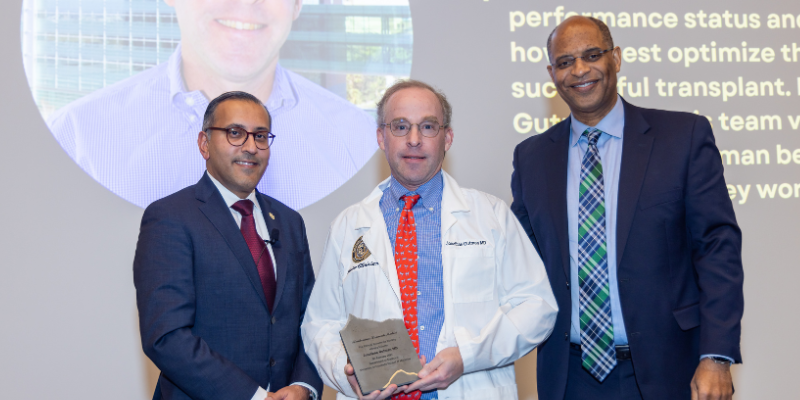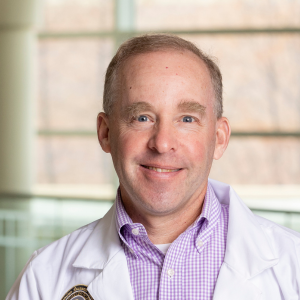When patients talk with Jonathan Gutman, MD, the conversations often are difficult.
“The people you’re dealing with are extremely sick, with life threatening diseases,” he says. “You’re dealing with people going through an experience whose outcomes range from incredible, miraculous success to horrible complications to not being able to control the disease.”
Gutman – a professor in the University of Colorado Department of Medicine’s Division of Hematology and a CU Cancer Center member – specializes in stem cell transplants for patients with leukemia and other blood cancers. His focus is allogeneic transplants – those involving donated stem cells – and, in particular, transplants using stem cell-rich blood extracted from the umbilical cord of a newborn baby.
Cord blood has been an important donor source over the last 20 years or so. Research published in 2020 by Gutman and others showed that recipient patients receiving cord-blood transplants did as well as or better than patients receiving transplants from matched siblings. Cord blood is banked for public use at storage centers worldwide, including the CU Cord Blood Bank, where Gutman is co-medical director.
It’s Gutman’s job to advise his patients on their options and the possible outcomes, good and bad. Bolstering him in that task, he says, is “my interest in people and in helping people in real need.”
His clinical work, he says, involves “dealing with all kinds of different people, with all kinds of different medical issues, all kinds of different views on the world, and all kinds of different ways of thinking about things and philosophies. I find it an incredibly rich thing to be able to engage with people and help them navigate this very challenging situation.”
For his clinical work, Gutman has been inducted as one of 21 University of Colorado Department of Medicine faculty members in the inaugural class of the department’s Clinical Excellence Society (CES), recognized as champions for their patients.
“It’s a great honor and a great society, and I’m thrilled to be inducted,” Gutman says.
→ More profiles of Clinical Excellence Society inductees

Jonathan Gutman, MD. Photo by Justin LeVett for the CU Department of Medicine
‘Medicine was my path’
“I don’t come from a family of doctors,” Gutman says, yet “I think there was always something calling me to medicine. The biggest driver was the notion of connecting and communicating with people and trying to help them.”
As an undergraduate at Princeton University, “I started with the theoretical notion of a pre-med path, but there were other things I wanted to do in college, some of which were not so academically minded. The real deal breaker was organic chemistry at 8:30 a.m. on a Friday. That ended my pre-med ambitions during college.”
Gutman majored in history. He says his father helped inspire his love of liberal-arts learning “and experiencing life.”
→ Between a Rock and a Hard Place: Jonathan Gutman, MD, Treats Climber for Leukemia
Ultimately, he says, “As I got more serious about thinking about my future, I decided medicine was my path.” After graduating magna cum laude from Princeton in 1996, he completed a yearlong post-baccalaureate pre-med program at Goucher College in Maryland, briefly worked for a health care consultancy, “then decided I’d rather head to Tahoe to ski for the season before starting med school.”
After receiving his MD at New York University in 2002, the young Dr. Gutman did his internal medicine residency at CU, followed by a hematology/oncology fellowship in 2006-2009 at the University of Washington’s renowned Fred Hutchison Cancer Research Center, which at the time was pioneering new techniques in umbilical cord blood transplantation. Gutman cites Colleen Delaney, MD, and Frederick Appelbaum, MD, as among the “giants in the field” at Fred Hutch who helped inspire his interest in cord blood transplantation.
‘All about program building’
Having had a taste of life in Colorado, Gutman longed to return. “I love Colorado. I like the mountains, the outdoors, and the lifestyle. But one of the things that was very appealing was that the transplantation program was just getting started here. A lot of people coming out of fellowship, especially if they’re scientifically minded, want to be at a place that’s very well established and plug into a lab. But for me, it was all about program building, the opportunity to come here when there was very little and start to develop something.”
In their letter in support of Gutman’s CES induction, his Division of Hematology colleagues Dan Pollyea, MD (the division’s interim head), and former division head Craig Jordan, PhD, credited him with building “an outstanding and nationally recognized allogenic stem cell transplantation program” through his “hard work, perseverance, dedication, and leadership.”

Jonathan Gutman, MD, confers with a patient. Photo by Justin LeVett for the CU Department of Medicine.
They wrote that when Gutman joined the CU faculty in 2009, “relatively few transplants were being performed; there was no vision associated with the program; and given substantial private practice competition, there was little hope that the program could be successfully re-booted on this campus. In what would become a pattern, Dr. Gutman rolled up his sleeves and dug into this challenge. He assembled a talented core group of nurses, advanced practice providers, administrators, and ultimately other junior faculty with a shared interest in developing an outstanding clinical program.”
→ Acute Myeloid Leukemia Won’t Slow Down World Champion Triathlete
Gutman credits former CU medicine professor Han Myint, MD, as being an early ally in efforts to build what Pollyea and Jordan described as “one of the largest cord blood transplant programs in the world. To this day, our institution is known for this important niche, and Dr. Gutman’s research and clinical interests are the reason we enjoy this unique and important reputation.”
In 2023, the CU Allogeneic Stem Cell Transplantation Program that Gutman directs was among only 11 programs to be classified as “over-performing” out of 178 centers nationwide by the Center for International Blood and Marrow Transplant Research (CIBMTR).
‘Intense and close relationships’
In a letter describing his clinical mission, Gutman says he became a physician “because I wanted to take care of patients. Patient care, education of learners providing care, and clinical research associated with improving patient care remain my core passions even as I have acquired increasing non-clinical responsibilities.”
Gutman says he cherishes “the intense and close relationships that I develop with every patient I meet. When a transplant is successful, the results are remarkable.” But he also says that one of his most important clinical responsibilities is “helping patients and their families navigate situations when outcomes are not what we hope. I learn continuously from my patients as they go through this extreme experience, and the perspective they give me, I believe, continuously improves me as a physician and a person.”
→ Jonathan Gutman, MD, Talks About the Latest In CAR-T-Cell Therapy
In building caring relationships with patients, Gutman cites his mother as “tremendously influential. She’s a wonderful person. She would say I have no emotional quotient, but I believe that I do, and it comes from her.”
Asked how he advises young doctors interested in following in his path, Gutman says: “My starting point is always to encourage them to find what makes them happy, what drives them, and then to pursue that. I don’t like a formulaic approach. I’ve mentored a lot of folks who have interest in this field, and I do everything I can to be supportive and help them on their path, but I can be a little iconoclastic in encouraging them to pursue their interests, even if they aren’t totally conventional.”
Photo at top: Jonathan Gutman, MD, is inducted into the CU Department of Medicine's Clinical Excellence Society by department Chair Vineet Chopra, MD, MSc (left) and John Carethers, MD, vice chancellor for health sciences at the University of California, San Diego, at a ceremony on February 8, 2024. Photo by Paul Wedlake for the CU Department of Medicine.




.png)